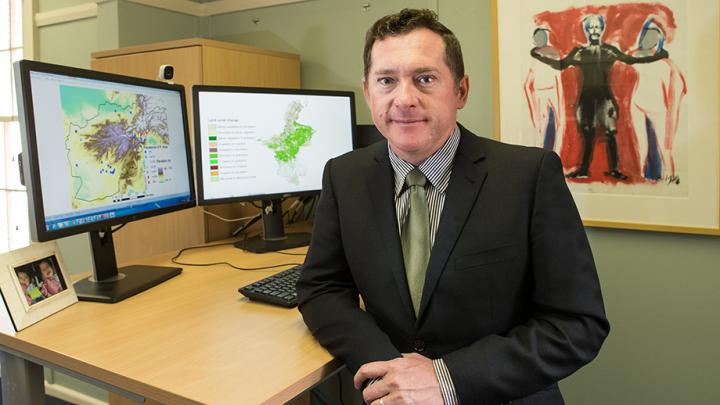Tracking parasites with satellites

This is Professor Archie Clements, Director at the ANU Research School of Population Health. Credit: Stuart Hay, ANU
Project leader Professor Archie Clements, from The Australian National University, said the research could help authorities in developing countries fight parasitic diseases.
“Some diseases are highly sensitive to their environment, especially parasitic diseases. With remote sensing you can identify places where disease flourishes,” said Professor Clements, Director of the ANU Research School of Population Health.
“This information is useful for decision makers to help them ensure scarce resources are targeted to where they are most needed.”
Parasitic diseases affect hundreds of millions of people every year, many of them in the least developed parts of the world.
The team uses satellite data such as temperature, rainfall, vegetation and land usage, and combines it with health data in a geographical information system (GIS).
The approach combines the skills of many scientists, such as entomologists, epidemiologists, software developers, social scientists and health policy specialists.
“The result is maps that are accessible to countries with limited capacity for managing disease data, tailored to their local needs.”
The team has trialed systems for malaria in Bhutan, Vanuatu and the Solomon Islands and is now seeking support to scale up to larger countries. Additionally, spatial predictions for other diseases such as worms and hydatids are being developed for China, the Philippines and other countries in the Asia-Pacific region.
“By taking this research the next step, we have the opportunity to have a meaningful impact on the real world, and save a lot of lives,” Professor Clements said.
Professor Clements is laying out a plan for the future of these systems at a symposium at the American Association for the Advancement of Science Conference, in San Jose, California this weekend.
Media Contact
All latest news from the category: Health and Medicine
This subject area encompasses research and studies in the field of human medicine.
Among the wide-ranging list of topics covered here are anesthesiology, anatomy, surgery, human genetics, hygiene and environmental medicine, internal medicine, neurology, pharmacology, physiology, urology and dental medicine.
Newest articles

First-of-its-kind study uses remote sensing to monitor plastic debris in rivers and lakes
Remote sensing creates a cost-effective solution to monitoring plastic pollution. A first-of-its-kind study from researchers at the University of Minnesota Twin Cities shows how remote sensing can help monitor and…

Laser-based artificial neuron mimics nerve cell functions at lightning speed
With a processing speed a billion times faster than nature, chip-based laser neuron could help advance AI tasks such as pattern recognition and sequence prediction. Researchers have developed a laser-based…

Optimising the processing of plastic waste
Just one look in the yellow bin reveals a colourful jumble of different types of plastic. However, the purer and more uniform plastic waste is, the easier it is to…



